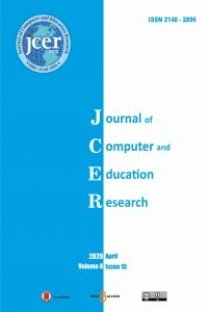Phenomenon-Based Learning for Teaching ICT Subject through other Subjects in Primary Schools
Phenomenon-based learning, learning processes, effectiveness of learning
Phenomenon-Based Learning for Teaching ICT Subject through other Subjects in Primary Schools
___
- Blogger, G. (2018). Phenomenon-based learning in finland inspires student inquiry. Retrieved from https://blogs.edweek.org/edweek/global_learning/2018/10/phenomenonbased_learning_in_finland_inspires_inquiry.html
- Francis, C., Breland, T. A., Østergaard, E., Lieblein, G., & Morse, S. (2013). Phenomenon-based learning in agroecology: a prerequisite for transdisciplinarity and responsible action. Agroecology and Sustainable Food Systems, 37(1), 60-75.
- İlgaz, S. & Çelen, A. (2017). Ayrılıp birleşme ve ötbb (öğrenci takımları başarı bölümleri) yöntemlerinin sosyal bilgiler akademik başarıya etkisinin karşılaştırılması [Issues in the use of information and communication technologies and unethical behaviors: an overview]. Journal of Computer and Education Research, 5 (10), 174-193.
- Ismajli, H., & Krasniqi, D. (2018). Challenges for achieving learning outcomes of languages and communication curriculum area in primary education in kosovo. International e-Journal of Educational Studies (IEJES), 2 (4), 81-91.
- Mohammed, G. S., Wakil, K., & Nawroly, S. S. (2018). The effectiveness of microlearning to improve students’ learning ability. International Journal of Educational Research Review, 3(3), 32-38.
- Nawzad, L., Rahim, D., & Said, K. W. (2018). The effectiveness of technology for improving the teaching of natural science subjects. Indonesian Journal of Curriculum and Educational Technology Studies, 6 (1), 15-21.
- Raahan, B. D. (2016). Addressing the disconnect. Retrieved from https://www.thestatesman.com/supplements/campus/addressing-the-disconnect-1482186094.html.
- Silander, P. (2015). Phenomenon based learning. Retrieved from http://www.phenomenaleducation.info/phenomenon-based-learning.html
- Spiller, P. (2017). Could subjects soon be a thing of the past in Finland? Retrieved from https://www.bbc.com/news/world-europe-39889523
- Symeonidis, V., & Schwarz, J. F. (2016). Phenomenon-based teaching and learning through the pedagogical lenses of phenomenology: The recent curriculum reform in Finland. Forum Oświatowe, 28 (2), 31-47.
- Valanne, E. A., Al Dhaheri, R. M., Kylmalahti, R., & Sandholm-Rangell, H. (2017). Phenomenon based learning implemented in abu dhabi school model. International Journal of Humanities and Social Sciences, 9 (3).
- Wakil, K., Khdir, S., Sabir, L. & Nawzad, L. (2019). Student ability for learning computer programming languages in primary schools. International e-Journal of Educational Studies (IEJES), 3 (6), 109-115. DOI: 10.31458/iejes.531830
- Wakil, K., Muhamad, D., Sardar, K., & Jalal, S. (2017a). The impact of teaching ict for developing education systems. Int. J. of Adv. Res, 5, 873-879.
- Wakil, K., Nasraddin, R., & Abdulrahan, R. (2018). The role of social media on students gpa. Indonesian Journal of Curriculum and Educational Technology Studies, 6(1), 1-5.
- Wakil, K., Omer, S., & Omer, B. (2017b). Impact of computer games on students gpa. European Journal of Education Studies, 3 (8), 262-272. doi:10.5281/zenodo.827400
- Wakil, K., Qaisar, N., & Mohammed, C. (2017c). Enriching classrooms with technology in the basic schools. European Journal of Open Education and E-learning Studies, 2 (1), 99-108.
- Zhukov, T. (2016). Phenomenon-Based Learning: What is PBL? Retrieved from https://www.noodle.com/articles/phenomenon-based-learning-what-is-pbl
- Yayın Aralığı: 2
- Başlangıç: 2013
- Yayıncı: Tamer KUTLUCA
A Case Study on Students’ Identity Perceptions Using Literary Sources in Reading Courses
Yıldırım ÖZSEVGEÇ, Volkan MUTLU
İlkokulda STEM: Öğrencilerin Kariyer İlgileri ve Tutumları
Mathematics Teachers’ Views on Mathematical Thinking
Emine Nur ÜNVEREN BİLGİÇ, Ayşe Zeynep AZAK
Ebru KÜKEY, Recep ASLANER, Tayfun TUTAK
Ortaya Çıkan Modelleme Yaklaşımıyla Kavramlaştırma Süreci: Sembolleştirme Örneği
İlkokul 3. Sınıf Fen Bilimleri Ders Kitabında: Dilbilgisel Eğretileme Olarak Adlaştırma
An Examination of Middle School 7th Grade Students’ Mathematical Abstraction Processes
Elif KILIÇOĞLU, Abdullah KAPLAN
Ortaya Çıkan Modelleme Yaklaşımıyla Parantez Kullanımının Anlamlandırılma Süreci
The Scale of Happiness Strategies for Childrens Used by Preschool Teachers
